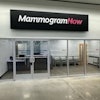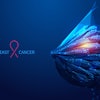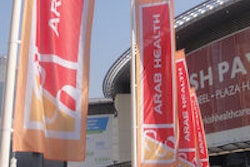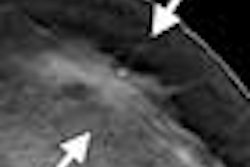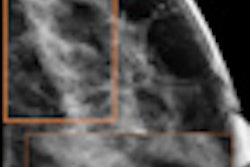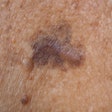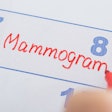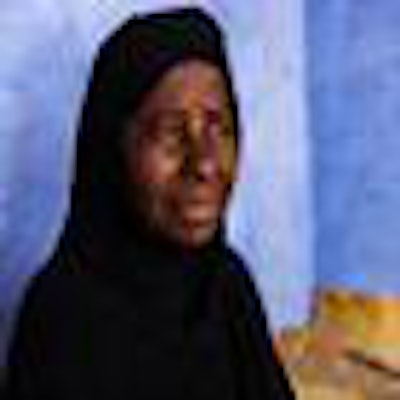
DUBAI - Fresh data about the Egyptian breast cancer screening program released on the second day of Arab Health confirm that "unreachables" -- patients with suspicious cases who fail to show for follow-up -- remain a serious problem.
"They come for screening, they're diagnosed, and then they refuse or escape treatment options," said Dr. Dorria Saleh El Sayed Salem, professor of radiology at Cairo University Hospital. "Sometimes our ladies give us wrong telephone numbers and we have to use midwives to help us reach them."
 All breast services, both diagnostic and therapeutic, are provided completely free of charge to women in Egypt, noted Dr. Dorria Saleh El Sayed Salem. Image courtesy of the European Society of Radiology.
All breast services, both diagnostic and therapeutic, are provided completely free of charge to women in Egypt, noted Dr. Dorria Saleh El Sayed Salem. Image courtesy of the European Society of Radiology.During the first five years, a total of 107,193 women were screened, and 2,024 suspicious cases (BI-RADS 4 and BI-RADS 5) were identified. Of those, 454 proved to be pathologically malignant, 478 were downgraded with ultrasound, 544 are still being investigated, 374 were unreachable, and the remaining 174 women could not be categorized.
Of the malignant cases, 411 women were operated upon, 153 conservatively and 258 by modified radical mastectomy. The majority of these cases presented as a mass or calcification. Most women were younger than 60, and 90% lived in urban areas. In 16.1% of cases there was a family history of breast cancer.
"We have to think outside of the box to get to the unreachables," she said. "Customer 'touch points' are set up at teaching hospitals or cancer institutes. Encouraging letters are sent by hand to invite them to come back, and we go on the phones all the time."
Breast cancer is one of Egypt's three leading diseases: its incidence is around 42.5 per 100,000 women and the mortality rate far outstrips other cancer deaths, explained Salem, who is advisor to the Minister of Health and director of the national Women's Outreach Program (WOP) for breast cancer screening. According to the Women's National Council, breast cancer represents 33% of all female cancers. About 10% of breast cancers are metastatic at presentation, tumors on average are 5 cm in diameter, and the average age at presentation is 10 years younger than in Europe and North America.
A pilot breast screening project was launched in October 2007. Four mobile units and one fixed mammography unit covered the districts of Cairo and Giza for 12 months before the scheme went nationwide in 2008.
The program has had its share of logistical, operational, and medical challenges, she conceded. Egypt's population of 85 million is spread across a vast area of 1 million km2 and there are many poor, isolated communities. Also, general practitioners (GP) have little concept of screening programs, and radiologists lacked the mammography skills necessary for screening work. This meant upgrading public mammography services, making screening mobile, and creating a center of excellence as a hub for remote mobile reporting using ADSL.
 Hundreds of Egyptian women have been diagnosed with suspected breast cancer since 2007, but have then disappeared.
Hundreds of Egyptian women have been diagnosed with suspected breast cancer since 2007, but have then disappeared.Top of the list of current challenges is to maintain a continuous funding system, according to Salem. The initial outlay for each of the 10 mobile units is around 6.75 million Egyptian Pounds (about 754,000 euros), and the annual running cost of each unit is about 1.6 million EGP (179,000 euros). The WOP team organizes regular campaigns to seek donations from pharmaceutical companies, mammography equipment suppliers, and Egyptian businesspeople.
"We had a lot of missing data entry, and the solution was continuous staff training. We had Internet delays and missing data transfer," she said. "Also, there was a lack of experienced radiologists, especially in the south, and the solution has been more onsite training by members of our team on ultrasound, wire localization, and biopsy."
Young radiologists have been recruited to the program. WOP staff teaches them how to read mammograms in exchange for which the radiologists perform data entry tasks. A shortage of trained surgeons, oncologists, and pathologists is another ongoing problem. To get around this, BI-RADS 4 and 5 cases are managed at the nearest university hospital, with assistance from the WOP team.
Among Salem's future goals is to establish a central laboratory for pathology results and continue to educate Egyptians about the value of early detection of breast cancer. To provide reliable and objective information and answer queries from GPs and patients, she has established a website and call center, as well as running a TV and radio campaign.
She wants WOP staff to continue to educate and train doctors, radiologists, and technicians. New awareness campaigns will be used to reach the public, and further academic papers will be published and posters will be presented at scientific meetings.
"Our logo is a representation of the breast cancer pink ribbon that includes the Egyptian character known as the key of life. For ancient Egyptians, this symbol meant strength and health, and for our program this is the symbol of hope and life for all Egyptian women," she stated, quoting the scheme's slogan, "Early detection is our only protection." "I am really proud to say that all our services, both diagnostic and therapeutic, are provided completely free of charge."
Editor's note: During the 2012 European Congress of Radiology, Salem impressed delegates with her presentation at the European Society of Radiology Meets Egypt keynote session. For a report on that talk and more background on the breast screening program, click here.
